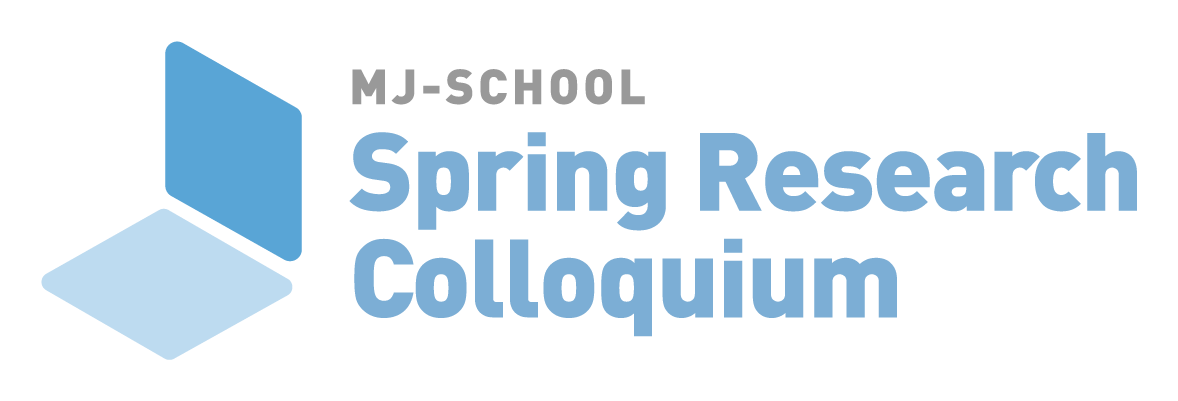Overview/Registration

The UNC Hussman School of Journalism and Media will celebrate the outstanding ongoing research at the school in its annual Spring Research Colloquium May 2 at the Freedom Forum Conference Center.
Dr. W. Timothy Coombs, a professor at Texas A&M University, will deliver his keynote address on crisis communication. The schedule will also feature research presentations from current Hussman School graduate and Ph.D. students and a lunchtime panel discussion.
Please register by 5 p.m. Monday, April 30 to assist with meal ordering.
Schedule
8:15-9 a.m. | Breakfast
9-10 a.m. | A closer look at time in crisis communication: When crisis communication is 'rocket science.' | Keynote address by W. Timothy Coombs, Texas A&M University
10:15-11 a.m. | Health Communication Research Presentations | Moderated by Allison Lazard
- The role of knowledge and risk beliefs in adolescent e-cigarette use: A pilot study | Jacob A. Rohde, Seth M. Noar, Casey Horvitz, Allison J. Lazard, Jennifer Cornacchione Ross, Erin L. Sutfin
- The importance of parental self-efficacy, attitude, and parental monitoring, and its effects toward children's type 1 diabetes management | Trevor Bell
- Can opioid gatekeepers uphold patient-centered care? | Elizabeth Troutman Adams, Whittney Darnell, Elisia Cohen, Andrew Bernard
11:15 a.m.-12:15 p.m. | Mass Media & Society: Science, Politics and Gender Research Presentations, Session 1 | Moderated by Daniel Kreiss
- 'Pivoting' with the president's gaze: Exploring New York Times foreign-policy coverage across nine administrations | Kirsten Adams, Daniel Riffe, Meghan Sobel, Seoyeon Kim
- Community, communication, and crime Public safety information-seeking in an urban system | Chris Etheridge
- Shouting at the wall: Does negativity drive ideological cross-posting in Brexit Facebook comments? | Michael Bossetta
- Who is responsible for Twitter's echo chamber problem? Evidence from 2016 U.S. election networks | Lei Guo, Jacob A. Rohde, H. Denis Wu
12:15-1:15 p.m. | Working Lunch with Grant Panel | With panelists Daniel Riffe, Lucinda Austin, Allison Lazard and Tania Osborn
1:30-2:30 p.m. | Mass Media & Society: Science, Politics and Gender Research Presentations, Session 2 | Moderated by Rhonda Gibson
- One Direction real person fiction on Wattpad.com: A textual analysis of sex and romance | Ashley Marie Hedrick
- Gendered violence in young adult literature | Meredith Katherine Collins
- With her or against him? An examination of U.S. newspapers' 2016 presidential candidate endorsements | Kirsten Adams
- Science in pieces: Public science in the deformation age | Scott Brennen
2:45-4 p.m. | Public Relations and Strategic Marketing Research Presentations | Moderated by Adam Saffer
- Differentiating accidental crisis types: Examining effects on organizations’ perceived responsibility, reputation, and corporate ability | Seoyeon Kim
- Mapping the knowledge construction and invisible college of dialogue: A bibliometric analysis of public relations research | Jordan Morehouse, Adam Saffer
- Exploring country-of-origin perceptions and ethnocentrism: Implications for PR efforts to introduce U.S. dairy products to China | Xiaohan Xu
- Situational crisis, identification, and blame transfer: An investigation into stakeholders' perceptions of crises in the NFL | Jennifer L. Harker
- Countering mental health stigma: Recommendations for a social marketing campaign | Christine Scalora
4 p.m. | Adjourn: meet and greet on Franklin Street to follow
Keynote Speaker
 Dr. W. Timothy Coombs is a professor in the Department of Communication at Texas A&M University and the current editor for Corporation Communication: An International Journal. In 2015, he was designated as an honorary professor in the Department of Business Communication at Aarhus University in Denmark.
Dr. W. Timothy Coombs is a professor in the Department of Communication at Texas A&M University and the current editor for Corporation Communication: An International Journal. In 2015, he was designated as an honorary professor in the Department of Business Communication at Aarhus University in Denmark.
Coombs received the 2002 Jackson, Jackson & Wagner Behavioral Science Prize from the Public Relations Society of America, the 2013 Pathfinder Award from the Institute of Public Relations, and multiple PRIDE awards from the Public Relations Division of the National Communication Association.
Lunch Panel
Four Hussman School faculty and staff members will discuss opportunities for research grants.
Daniel Riffe | Richard Cole Eminent Professor
Lucinda Austin | Assistant Professor
Allison Lazard | Assistant Professor
Tania Osborn | Contracts and Grants Administrator
Research Legacy at the Hussman School
Over the last 50 years, our school has been at the forefront of inquiry into the nature of communication and how changing media technologies and practices affect our lives as citizens in a democracy, as human beings with health needs and as consumers in a competitive marketplace.
During the 1960s and 1970s, our researchers originated the concept of the agenda-setting function of the press, which would become one of the most influential models in the history of the field. Our forward-looking faculty taught generations of students to incorporate social science methods and computation into news reporting in the 1980s, anticipating the shift to data-driven journalism by 30 years. Our school was also at the forefront of scholarship on media history and the legal institutions required for robust democracy, as well as in the study of the effects of media exposure on our attitudes, emotions and behaviors. Also in the 1980s, our researchers helped mold the field of health communication, spurring a national movement to study the power of the media to help people live longer and healthier lives.
Today, faculty and graduate student researchers are carrying this legacy into a future marked by rapid technological change. Together, we are helping to reinvent the theoretical and methodological tools that communication scholars use for understanding the world. We analyze digital flows of social influence, the impact of Internet architecture in health communication and ways that social media shape our understanding of self and society. We work to understand the conditions under which media businesses succeed. Our guidance has helped to enable businesses to thrive, whether serving communities of 400 people or countries of a billion people. We work on global issues, such as human- trafficking, climate change and disease prevention, by helping journalists and scientists communicate effectively with audiences. We examine national issues such as Internet privacy by mapping the state of media and American democracy. We are at the forefront of psychological and behavioral research involving digital media, and we translate our findings into applications that serve the industry and society as a whole.
For more on research at the UNC Hussman School of Journalism and Media, visit mj.unc.edu/research.